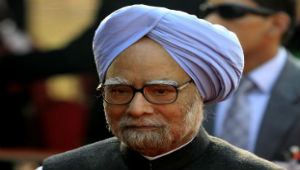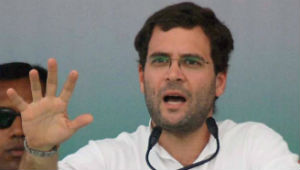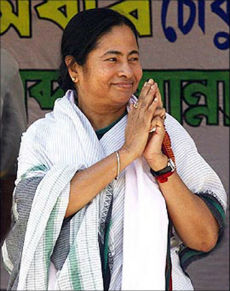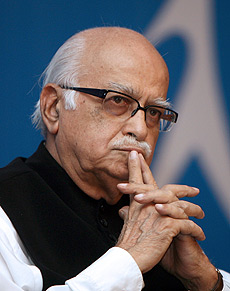Chaitra Krushnapaksha 12, Kaliyug Varsha 5115
By Swapan Dasgupta
 |
 |
 |
 |
For reasons that are quite inexplicable, people outside New Delhi's charmed circle expect journalists to have answers to the most complex of questions. One question that dogs representatives of the media at social gatherings and at casual roadside meetings with relative strangers is: When will elections be held?
It's a question that, ideally, shouldn't be asked. On the face of it, the UPA-2 Government may be in a minority but it still has the capacity to outvote the Opposition in the Lok Sabha. It has the ability to get the Finance Bill passed, albeit without any worthwhile discussion; it still possesses the numbers to get the Land Acquisitions Bill and the Food Security Bill passed, regardless of their inherent imperfections; and in the event of someone actually getting the numbers to move a no-confidence motion, the Government still has the manoeuvrability to get it defeated, using means that are both fair or dodgy. There is no real threat of the Government falling on the floor of the House.
The question nevertheless arises: Why do people persist with this question? Why, for that matter, have TV channels already started preparations for a general election, egged on perhaps by know-alls who insist that November/ December 2013 could be the time of reckoning?
Accidents do happen in politics and the best plans can often go awry thanks to the unforeseen consequences of a relatively trivial incident. It is also possible, as some say, that encouraged by a positive verdict in Karnataka and fearful of the possible drubbing in the Assembly elections in Madhya Pradesh, Rajasthan, Chhattisgarh and Delhi, the Congress may opt for a damage limitation scheme. The calculation is that it would be better to fight the four Assembly and Lok Sabha elections simultaneously in order to prevent the post-December demoralisation from infecting the Congress morale.
Against this are those who insist that the Congress needs a little more time for two things. First, to ensure the passage of their two so-called flagship Bills, and time to allow more people to enrol in the Aadhaar scheme; and second, to allow more time for the economic indicators to improve.
‘Tomorrow will be better' is not merely the motto of stock market punters, it is the constant refrain of those whose future at present seems rather gloomy. After all, major political decisions aren't merely taken by those who will seek re-election; they are also heavily influenced by the larger durbar which stands to lose the most in the event of a change in Government. Ten months, after all, to massacre the essence of Harold Wilson's observation, can be a very long time in politics-sufficient time for darkness to turn to light.
Ironically, the elections-as-per-schedule camp has unlikely supporters in the Opposition. For a section of the BJP, the interregnum could be used to effect the full transition of Gujarat Chief Minister Narendra Modi from a regional player to the national alternative.
In the past few weeks, I have heard mutterings about Modi being over-exposed and “peaking” too early. To my mind, this is rubbish. In a country as large and diverse as India, it takes a very long time for a political message to seep into the localities. Modi is a hit among most of the middle classes and those who are accustomed to watching TV news channels. But the buzz from Middle India will still need time to echo in other quarters-and more so since the BJP has imbibed the RSS tradition of believing that a year has 18 months.
For Modi's many detractors, both within the BJP and in the NDA, a hasty rush to the polls is unwelcome. They hope that the intervening months will give Modi a long enough rope to commit political hara-kiri. As things stand at present, the groundswell within the BJP in favour of Modi is proving to be more and more irresistible. Ananth Kumar discovered this at a Bangalore rally where he was booed; and Shatrughan Sinha in Bihar found this when his thunderous proclamation of a NDA Government led by LK Advani was interrupted by shouts of “Modi, Modi”.
The Gujarat Chief Minister's detractors can't hope to match him in all-India popularity or charisma. Their best hope is that either Modi will self-destruct or that the RSS will be persuaded that ambivalence over a leader is preferable to certitude.
The irony is that these political games are going on in a rarefied world. The reason why the aam person persists with queries over the timing of the election doesn't require a Rosetta Stone to decipher: There is complete exasperation with a dysfunctional and cynical Government that gets more and more discredited with every passing day. Unlike many of us who get an opportunity to express our disaffection through newspaper columns and TV chat shows, most people can only speak through their vote. To my mind, they are getting increasingly impatient to do just that. India's traditional sense of fatalism may have eroded far more than politicians have factored.
“It is not corruption but caste that matters” is the piece of wisdom given to me last week when I suggested that the next election could be about a dream and a nightmare. I don't know who is going to be proved right or whether the Indian muddle will prove us both wrong. But one thing is certain: Things can't continue like this indefinitely. India needs a Government.
Source : The pioneer




